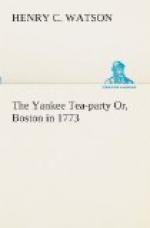“How long did the expedition occupy?” enquired Hand.
“About two months,” replied Davenport. “For thirty-two days we traversed a dreary wilderness without meeting a human being.”
“It was a great feat, and the men who performed it are entitled to high renown,” said Hand.
“Many of them afterwards became distinguished,” said Davenport. “Morgan, Dearborn, Meigs, Febiger, Greene and others were known to the enemy in after years.”
Mr. Hand now proposed three cheers for the men of Arnold’s expedition and three more for Mr. Davenport, both of which propositions were acted upon in the heartiest manner by the young men. Mr. Hand then said he had a song to sing to the tune of “Ye Mariners of England.” It was not his own composition; he had found it in print, and knowing the music, thought it would be acceptable. Being pressed to sing, he complied, singing the following words:—
Ye freemen of Columbia,
Who guard our
native coast,
Whose fathers won your liberty,
Your country’s
pride and boast;
Your glorious standard rear
again,
To match your
ancient foe,
As she roars on your shores,
Where the stormy
tempests blow;
As she prowls for prey on
every shore,
Where the stormy
tempests blow.
The spirits of your fathers
Shall hover o’er
each plain,
Where in their injured country’s
cause
The immortal brave
were slain!
Where bold Montgomery fearless
fell,
Where carnage
strew’d the field,
In your might shall you fight,
And force the
foe to yield;
And on the heights of Abraham
Your country’s
vengeance wield.
Columbia fears no enemy
That ploughs the
briny main;
Her home a mighty continent,
Its soil her rich
domain!
To avenge our much-loved country’s
wrongs,
To the field her
sons shall fly,
While alarms sound to arms,
We’ll conquer
or we’ll die.
When Britain’s tears
may flow in vain,
As low her legions
lie!
Columbia’s eagle standard
Triumphant then
shall tower,
Till from the land the foe
depart,
Driven by its
gallant power.
Then, then, ye patriot warriors!
Our song and feast
shall flow,
And no more, on our shore,
Shall war’s
dread tempests blow;
But the breeze of peace shall
gently breathe,
Like the winds
that murmur low.
The song was well received by the company, who were not disposed to be critical. The drum and fife were then brought into play, Brown and Hanson, without entreaty, striking up, “Come out, ye Continentallers.” This rollicking tune called up such laughable associations, that one of the young men proposed that it should be sung. No one knew it entire, except Brown, the fifer, who had been the musician of his mess as well as of the company, and Brown complied with the repeated entreaties of the young men, singing the following ludicrous words in a cracked and weak remnant of a voice.




